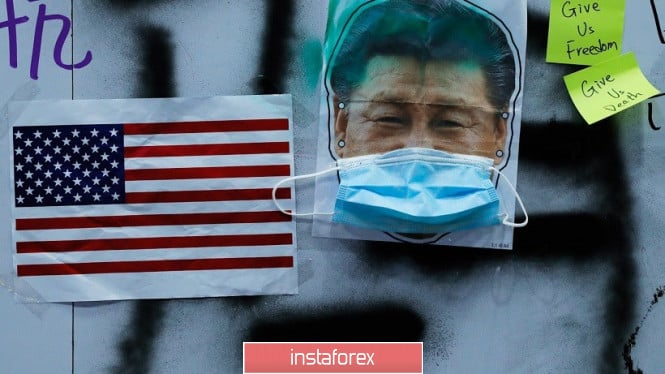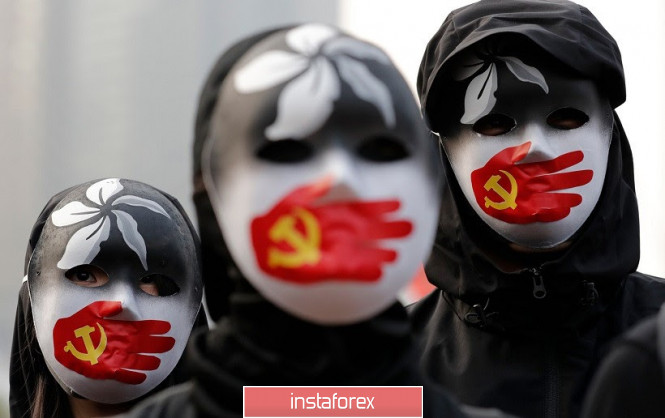General sentiment in the foreign exchange market has not changed over the weekend: anti-risk sentiment is still prevailing, providing background support for the US currency. High-ranking officials from the United States and China continue to exchange high-profile accusations that only exacerbate the overall situation. The high-profile national security bill in Hong Kong added fuel to the fire: now Washington is threatening Beijing with sanctions, not only in connection with a possible refusal to jointly investigate the causes of COVID-19, but also in connection with the "capture" of Hong Kong. China fights back - they say it's impossible to capture what is rightfully yours. After all, Beijing considers Hong Kong to be its full territory, where the formula "one country - two political systems." Therefore, any comments of American politicians regarding the Hong Kong issue, the Chinese perceive with hostility, claiming interference in the internal affairs of the state.

Nevertheless, Washington has been putting pressure on this "corn" for quite some time, provoking the anger of high-ranking Chinese politicians. First, the Americans openly supported anti-Chinese protests in Hong Kong. Back in November last year, Trump signed scandalous bills that supported Hong Kong protesters. Under the first law, the US Department of State must confirm to Congress at least once a year that Hong Kong maintains sufficient autonomy to maintain favorable trading conditions with the United States. Otherwise, the document provides for sanctions against the city authorities for violating human rights. The second law banned the supply of funds to the Hong Kong police that could be used to disperse demonstrations: tear and pepper gases, rubber bullets and stun guns.
The coronavirus blocked the protest movements of anti-Chinese activists for several months, but so far the rallies have flared up with renewed vigor, especially since Beijing has provided yet another piece of information to"rock the boat". Initially, protests began against considering amendments to the law on extradition of suspects, which would allow Hong Kong to extradite suspects to jurisdictions with which it does not have an extradition agreement (including Taiwan, Macau and mainland China). According to the protesters, this rule of law posed a threat to those activists who disagree with the policies of official Beijing. Subsequently, the Hong Kong administration refused to consider these amendments, and then completely removed them from the agenda. But, as they say, "appetite came with eating" - protesters have already begun to demand liberalization of local legislation and a decrease in the influence of mainland influence.
Beijing responded in a peculiar way: Chinese parliamentarians introduced a bill on national security in Hong Kong. According to this document, the special administrative region of the PRC should at the legislative level prevent "treason, schism, incitement and subversive activity" against the government in Beijing. Supporters of democracy in Hong Kong consider this step another attempt by the Chinese Communist leadership to level out local freedoms. Nevertheless, the bill is already on the agenda of the session of the National People's Congress, which began on May 22 and will last until May 28. This initiative was opposed not only by the United States, but also by the European Union, Canada, Great Britain, and also Australia. However, according to some analysts, Beijing is very likely to adopt the bill, provoking retaliatory sanctions from Washington.

Thus, the growth of anti-risk sentiment in the foreign exchange market is justified. Moreover, the United States exerts pressure on the PRC not only on the "Hong Kong line", but also on the issue of COVID-19. In particular, yesterday, Trump's national security adviser Robert O'Brien compared the actions of China after the outbreak of coronavirus with concealing the disaster at the Chernobyl nuclear power plant by the Soviet Union in 1986. Such accusations were made against the backdrop of the Republican legislative initiative - Lindsay Graham's bill allows President Donald Trump to impose sanctions on China for refusing to cooperate in identifying the causes of the pandemic.
Thus, US sanctions against China are only getting stronger. The Cold War between the United States and China will obviously slow down the global economic recovery after the coronavirus crisis, and this fact puts pressure on risky currencies. The dollar, in turn, can again "return to the game," since recently it has been playing the role of the main defensive asset. The foreign exchange market is passive today because the United States is celebrating Memorial Day - US trading floors are closed. Therefore, the main price fluctuations for the will begin on Tuesday.
If Beijing does not refuse to adopt the above bill (which is unlikely), and the representatives of China and the United States do not sit at the negotiating table regarding the investigation of the causes of COVID-19 (which is almost unbelievable), then the pressure on the pair will continue. This will allow the pair bears to test the nearest support level of 1.0860 (the middle line of the Bollinger Bands indicator, which coincides with the Kijun-sen line on the daily chart). If the rhetoric of the parties is tightened, then sellers will be able to push the pair to the bottom of the eighth figure. If the PRC shows signs of compromise (at least in the Hong Kong issue), then the bulls will be able to return to the upper line of the Bollinger Bands indicator, that is, to the 1.0990 level. But this scenario is not basic, given the recent statements by senior politicians in both China and the United States.
The material has been provided by InstaForex Company - www.instaforex.com